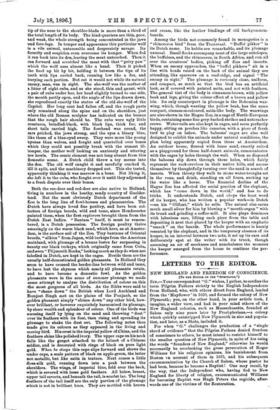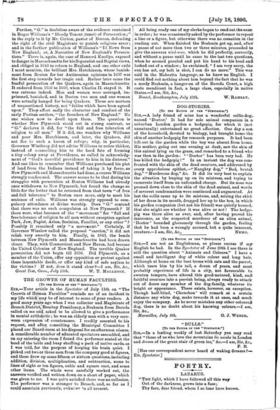LETTERS TO THE EDITOR.
NEW ENGLAND AND FREEDOM OF CONSCIENCE.
[TO THE EDITOR OF THE • SPECTATOR]
SIR,—Your correspondent "G." wishes, I gather, to confine the term Pilgrim Fathers strictly to the English Independents from Holland, who, with others direct from England, landed from the • Mayflower ' in 1620, and formed the colony of New Plymouth ; you, on the other hand, in your article took, I imagine, a wider view, and bad in your mind others of the New England colonies, such as Massachusetts, founded at Salem only nine years later by Presbyterians,—a colony which quickly outstripped New Plymouth in size and popula- tion, and later, as a State, included it.
For when "G." challenges the production of a "single shred of evidence" that the Pilgrim Fathers denied freedom of conscience to others, he must intend to restrict himself to the smaller question of New Plymouth, in spite of his using the words "founders of New England," otherwise he would necessarily be overlooking the gross persecution of Roger Williams for his religious opinions, his banishment from Boston cis account of them in 1635, and his subsequent excommunication by the Church of Salem, whose pastor he had been, because he became a Baptist ! One may recall, by the way, that the Independent who, having fled to New England for liberty of religion, excommunicated Williams for becoming Baptist was Hugh Peters the regicide, after- wards one of the victims of the Restoration.
Further, "(1" is doubtless aware of the evidence contained in Roger Williams's "Bloody Tenent (tenet) of Persecution ;" in the reply to it by Mr. Cotton, pastor of Boston, defending the right of the civil Magistrate to punish religions error ; and in the further publication of Williams's "Ill News from New England; or, A Narrative of New England's Persecu- tions." There is, again, the case of Hanserd Knollys, exposed to danger inMassachusetts for his Separatist and Baptist views, and obliged in 1013 to return to England, and one other exile I must mention, the brilliant Mrs. Hutchinson, whose banish- ment from Boston for her Autinomian opinions in 1637 was the first step towards her tragic end. Rather later came the fearful persecution of the Quakers, again in Massachusetts. It endured from 1656 to 1660, when Charles II. stayed it. It was extreme indeed. Men and women were scourged, im- prisoned, banished, and in Boston two men and one woman were actually hanged for being Quakers. These are matters of unquestioned history, not "fables which have been agreed upon." They, affect sadly the character and conduct of the early Puritan settlers, "the founders of New England." No one wishes now to dwell upon them. The question is whether New Plymouth stood out in strong contrast, as "U." declares it did, for "the full and free toleration of religion to all men." If it did, one wonders why Williams and poor Mrs. Hutchinson, and later, the Quakers, did not flee to such a haven of refuge; why, in particular, Governor Winthrop did not advise Williams to retire thither, instead of counselling him to the hard fate of forming a tiny colony away at Providence, so called in acknowledg- ment of "God's merciful providence to him in his distress." And one likes to remember that Williams purchased his plot af land from the Indians instead of taking it by force, as New Plymouth and Massachusetts had done, a course Williams strongly condemned. The answer seems to be that during his struggles with persecution at Boston Williams had already once withdrawn to New Plymouth, but found the change so little for the better that he returned from that town "of free and full tolerance" to Boston once more, only to meet his sentence of exile. Williams was strongly opposed to com- pulsory attendance at divine worship. Does "U." contend that there was no such compulsion at New Plymouth ? If there were, what becomes of the "movement" for "full and free tolerance of religion to all men without exception against Turk, Jew, Papist, Arian, Socinian, Familist, or any other " ? Possibly it remained only "a movement." Certainly, if Governor Winslow called the proposal "carrion," it did not relish very sweetly to him. Finally, in 1643, the bonds between New Plymouth and Massachusetts had been drawn closer. They, with Connecticut and New Haven, had become the United Colonies of New England. The terrible Quaker persecution did not begin till 1656. Did Plymouth, as a member of the Union, offer any opposition or protest against these lamentable deeds, or offer any kind of safe asylum to the victims ? If not, does it stand clear P—I am, Sir, &c.,



































 Previous page
Previous page